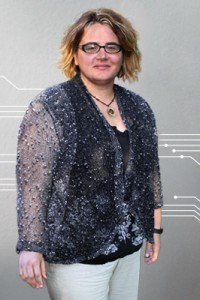DisCon III Report and 2021 WSFS Business Meeting

DisCon III, the 79th World Science Fiction Convention, took place December 15-19, 2021 at the Omni Shoreham in Washington DC. Guests of honor were John Harris and Nancy Kress, with special guests Andrea Hairston, Malka Older (who attended virtually), and Sheree Renée Thomas, plus fan guest of honor Ben Yalow. CoNZealand (Worldcon 78 in 2020) was the first entirely virtual Worldcon, and DisCon III was the first hybrid Worldcon, with major components for both in-person and virtual attendees. There were 2,359 in-person warm bodies and 1,197 virtual. CoNZealand reported 2,556 attending virtually, compared to Dublin’s (2019) 5,814 warm bodies, San Jose’s 5,440, or Helsinki’s 5,949. Adding 4,989 supporting memberships, attending no-shows, and a handful of other sales, total registered memberships for DisCon III were 9,293, compared to CoNZealand’s 4,646 total registered, Dublin’s 8,322 total registered, San Jose’s 7,812, and Helsinki’s 8,753.

Situated near Woodley Park and the Smithsonian Zoo, the Omni comprised a labyrinthine set of wings and towers which contained all in-person programming and official events. The neighborhood offered ample dining choices, with a host of even more interesting options a short car or Metro ride away. The hotel restaurant and outdoor fire pits served as social hubs, but fell short of providing true “bar con” atmosphere; the sprawling lobby areas were a secondary social hub, which were limited by regulations requiring guests in those areas to keep masks on, including while lounging at chairs and couches. Masks, generally speaking, made spotting friends far more challenging. Outside temperatures were slightly chilly.
The con suite was set up with strictly grab-and-go fare, and con chair Mary Robinette Kowal and her team had the hotel restaurant extend hours during the convention. Temporary cash bar stations appeared after restaurant hours.
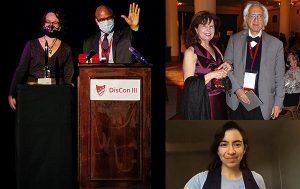
Events began Wednesday afternoon, including signings, a concert, “Kid-Friendly Crafting,” and more. Technical difficulties meant registration opened later than planned, and then struggled with lines the first few days, with people waiting well over an hour to get their vaccination record checked and then their badges.
At the Opening Ceremony, Duke Ellington School of the Arts Show Choir performed Christmas songs such as “Jingle Bells” and “Hark The Herald Angels Sing”. The Big Heart Award was presented to Linda Deneroff; also presented were three First Fandom awards: the Sam Moskowitz Archive Award to Kevin L. Cook, the First Fandom Posthumous Hall of Fame Award to Richard & Pat Lupoff, and the First Fandom Hall of Fame Award to William F. Nolan (posthumously).
PROGRAMMING
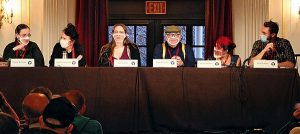
Program division head Farah Mendlesohn reported roughly 500 program items, including an African Programme Stream organized by African authors Oghenechovwe Donald Ekpeki and Nick Wood, plus 88 Kaffeeklatsches, 32 readings, 11 science talks, and 8 performances. “Approximately one third of all items were Virtual, with on site attendees programmed alongside distance attendees.” Mendlesohn reported 605 listed program participants – but an unknown number cancelled or did not show up; 21% of those listed were non-US. “We are particularly delighted with the African SF program stream (see above), the stellar selection of scientists secured by Inge Heyer, which includes a panel from NASA, and that we were able to enable so much remote participation which has ensured a high level of overseas engagement and participation of those unable to travel.” The CoNZealand schedule listed 612 items, down from 2019’s 1,218 items and 2018’s 771.
Virtual panels were held via Zoom and available to watch through the DisCon III website. Virtual content was beset with a host of problems, from streaming difficulties to confusion among panelists around how to participate and more. There was also a Discord channel.
While the programming FAQ referred to “a dedicated space for children’s programming,” the schedule itself listed only seven items total with the “children” or “teens” tags. ConZealand featured three items on the children’s track, which was down from 37 in 2019, 18 in 2018.
The schedule was available via the website interface, with areas of interest including academic, art, costume/cosplay, gaming, history, literature, writing, and more.
The Masquerade was Friday night. The Awards for Best in Show: Presentation went to La Calavera and Best in Show: Workmanship to A Ka’a Christmas Carol.
EXHIBITS & DEALERS’ ROOM
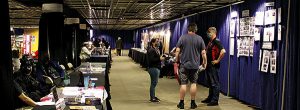
The dealers’ room, with nearly 60 vendors, included booksellers, publishers, jewelers, costumers, game vendors, and everything in between. The space was a large underground parking garage with a false ceiling for lighting and dressed with curtains around the exterior. It had a cramped, claustrophobic atmosphere despite sizeable walking lanes. Ian Randall Strock of Fantastic Books said, “This was a dealers’ room with all the ambience of a decommissioned parking garage. Poorly lit… it felt like we were as far from every other part of the convention as possible…. The foot traffic felt rather slow to me, even taking into account the diminished attendance due to the pandemic. On the other hand, I did turn a small profit…. Several other dealers I spoke with did very well…. To leaven my grumbling, however, the volunteers who helped with move-in and move-out were absolutely wonderful!” Joshua Palmatier of Zombies Need Brains said, “Overall the dealers room was fine. It was a shock to arrive at the loading dock and discover that the dealers room was going to take place in a literal converted parking garage, with the parking spaces and arrows for traffic still on the concrete floor. But dealers being dealers, I think everyone adjusted and adapted to the unexpected situation. It certainly made load-in and load-out easier with no stairs or elevators or anything like that to deal with. The con itself was great…. I did well with the table, given the situation and the reduced number of people in attendance at the con, but I did not do what I would have expected to do at a ‘regular’ Worldcon. As one of the other dealers mentioned, it felt more like having a table at a con like Boskone, not a Worldcon.” Jason Sizemore of Apex Publications said, “Customers at my table had trouble reading the back of our books. Sales weren’t great, but it wasn’t exactly an inviting location. However, aside from the lighting and the weirdness of being in a garage, it was fine. I appreciate how difficult it must have been for the ConCom to find a new location during a pandemic after the first hotel shut down. I was just happy to be there.”
ART SHOW
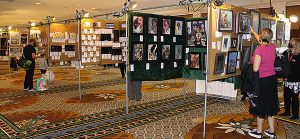
The program listed 44 Art Show participants, including GoH John Harris, Sara Felix, Richard Man, Maurizio Manzieri, John Picacio, Charles Vess, and more. Best in Show went to Ruth Sanderson for “Under the Crust”; Directors’ Choice to Sunny Jim Morgan for “Floral Plague Doctor Mask”; Night Security Guard’s Choice to Sarah Clemens for “Wildflowers”; and Judges’ Choices were Jim Burns for “Anisadora’s Choice”, Maurizio Manzieri for “Seven of Infinities”, Theresa Mather for “Chasing Wisdom”, and Vincent Villafranca for “Plague Doctor”.
PARTIES

There were roughly 42 parties on offer, both in-person and virtual, with some events happening on multiple dates. Virtual congoers also had access to a virtual con suite and virtual bartending events, where bartenders could guide participants in crafting cocktails. For in-person gatherings, party liason Quincy Waldron said, “Overall, people did well with the mask protocols and had a festive and joyous time. Parties were peaceful, and all walks of fans converged. We also offered our DisCon Party Guide for those who wanted non-food-themed party ideas and non-alcoholic beverage alternatives.” Virtual division head Nathan Lucas said, “We had a Virtual Party for all nominees Pre- and Post-awards. If they were unable to make it to the convention, they were able to attend the digital part. One of my volunteers stationed herself in the reception room and the in-person attendees were able to see and speak with the virtual attendees.” Parties included Chicon 8, Worldcon 2023 bid winner Chengdu, a combined Dublin/CoNZealand thank-you party, the Glasgow Gin, Tea and Cake Party, and several private parties; and at least one instance of a Hugo winner bringing along their Hugo Award to celebrate.
CON PUBLICATIONS
The souvenir book was 130 pages, with cover art and some interior images by John Harris, and a few illustrations of DisCon mascot DeeCee by Maya Hahto. Contents included a greeting from the chair, sections on GoHs and special guests, a list of Hugo Awards winners since ’53 and a list of World Science Fiction conventions since ‘39, the full committee list, a WSFS business material insert, and an In Memoriam page. Worldcon 79 also provided a 7″ x 5″ pocket program guide: 141 pages with listings and maps.
DeeCee’s News, the at-con newsletter, had early and late editions for a total of 8 issues, plus spoof issue #9. The newsletter featured site selection results, programming updates, events, useful information, the Masquerade winners list, and more.
HUGO AWARDS
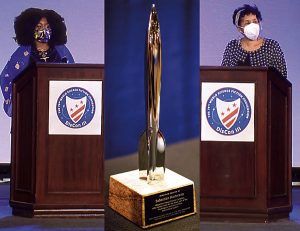
The 68th Hugo Awards Ceremony took place at 9:00 p.m. on Saturday, December 18, 2021 in the Regency Ballroom at the Omni Shoreham – delayed by one hour due to the smell of smoke in the ballroom, tracked down to a belt in a ventilation unit – and was also livestreamed. The masters of ceremonies were Andrea Hairston and Sheree Renée Thomas; the event was sponsored by Raytheon Intelligence & Space and Google.
Hairston opened by welcoming everyone to Washington, DC and leading into the line, “The question of who is and is not a true fan is a pox on our shared community,” challenging the idea of gatekeeping in fandom, to enthusiastic applause. Hairston and Thomas brought up Martin Luther King, Jr.’s discussion of technology and the way it rendered the world “a single neighborhood” in the context of both genre and today’s communities, ultimately exhorting everyone to “light the way” for future generations.
The Duke Ellington School of the Arts Radical Elite Drum Line performed, and after a brief “cavalcade” interruption, the awards presentation began.
The first Hugo Award of the night, Best Fanzine, went to nerds of a feather, flock together, edited by Adri Joy, Joe Sherry, The G. and Vance K. Sherry accepted, thanking the other editors, the contributors, and his wife. He thanked Aidan Moher, saying, “If Aidan didn’t put my name in the ear of The G. a number of years ago, right when I was about to basically get out of all of this, I wouldn’t be here.”
The Best Fancast Award went to The Coode Street Podcast, hosted by Jonathan Strahan and Gary K. Wolfe. Wolfe accepted, first reading Strahan’s speech, who thanked Wolfe, saying that if they’ve won a Hugo “you should know what I know: This is on him, and for more than 10 years I’ve been luckier than I deserve to be.” Wolfe then said, “he’s lying”, to a ripple of laughter from the crowd, “this was all his idea.” Wolfe thanked “the people who made it possible in our homes,” in other words, their families, as well as guests who’d come on the show, and the listeners.
Best Fan Artist went to Sara Felix. She thanked her family, the fanzines who asked her to do art for them, and “all the people, every week, who supported my tiaras, and just said how great they were, and it kept me going because it was so hard this year.”
The Best Fan Writer Award went to Elsa Sjunneson. Sjunneson accepted via video, speaking frankly about her marriage and divorce, saying, “This community kept me going. This work was how I processed my grief around the divorce, the pandemic, the experiences I had and the events that I witnessed as a protestor for Black Lives Matter. Fan writing helped me to grow…. Fan writing helped me to do something with myself when things got too hard.” Sjunneson spoke about kicking down doors, and exhorted Worldcon to create hybrid, international events which are more broadly inclusive. She thanked fellow finalists, her sisters, her partner Nate, Meg Elison, Michi Trota, Ada Palmer, and more. She thanked both the people who champion her work and the people who disagree with her, “because your arguments make me better.”
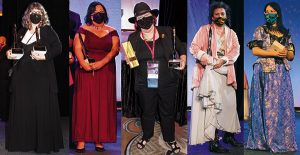
Diana M. Pho
Ellen Datlow won Best Editor Short Form. Datlow thanked everyone at Tordotcom, book publishers, writers, fellow nominees, and the voters.
Diana M. Pho won the Best Editor Long Form Award. Pho talked about the difficulties of the pandemic, saying, “it was unspeakably painful… knowing, sharply, your breath, the very words out of your mouth, can kill.” She spoke on the contradictions of winning a Hugo, saying, “It is so hard to feel the pressure and the honor to have the Hugo Award tonight. Everyone in this room and online has probably felt this ambivalent feeling. Every BIPOC person, or queer person, or if you are disabled, or any marginalization, that this world has made you fee rejected, and unknown, and unappreciated, possibly have felt this feeling of making impossible choices: to finally gain your glories at some kind of expense or judgment. Some kind of sacrifice or self-guessing that people outside of this experience perhaps cannot grasp. I am so grateful and yet I am so sorry. But you, all of you, help instill in me that something beautiful is happening. That our passion, our creativity, our art can still exist even in the face of death. And maybe in this glorious moment I feel we can feel triumphant.” She thanked the community, her wife Ashley, family, fandom, her authors, Jaymee Goh, Jeff VanderMeer, and more.
Vice chair Marguerite Smith presented Best Semiprozine, which went to Fiyah, published by Troy L. Wiggins, edited by DaVaun Sanders, Eboni Dunbar, Danny Lore, & Kaleb Russell, with reviews and social media by Brent Lambert and L.D. Lewis as art director. Lambert and Lewis accepted. Lambert said, “The road to this stage tonight was paved with resilience, incredible hard work, and the FIYAH team’s love for our community and each other. Love has always been our baseline… because unfortunately… science fiction and fantasy doesn’t hold real space for Black people, unless we make it. It doesn’t hold space for BIPOC, queer, disabled, marginalized creators and fans, unless we make it. Even as we receive this honor tonight, I’m under no illusion that our work can pause here. In fact, history bears out that when Black people make strides in the world it’s always met with backlash. Even our successes, unfortunately, become new burdens. But our history also bears out that from our burdens we can also make miracles. L.D. and me being on this stage tonight, it’s a miracle that our ancestors fought for. And for them we will continue this incredible journey, and I want to thank all of you for being a part of this with us.”
The Hugo for Best Graphic Story or Comic was won by Parable of the Sower: A Graphic Novel Adaptation by Octavia E. Butler, adapted by Damian Duffy, illustrated by John Jennings. Damian Duffy accepted virtually on behalf of the Octavia Butler estate, as well as for Jennings and himself. He thanked Butler and the estate, editor Charlotte Greenbaum, editorial advisor Tananarive Due, Nalo Hopkinson, family, and more. Jennings said, “I hope that Octavia’s advice for hope and resistance for the future is more carefully attended.”
Vice chair Lauren Raye Snow presented the Hugo Award for Best Professional Artist to Rovina Cai.
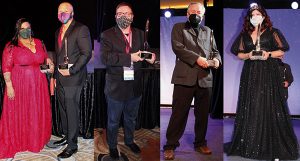
Brent Lambert; Fanzine:
Joe Sherry; Fancast:
Gary K. Wolfe; Fan Artist: Sara Felix
Best Dramatic Presentation Short Form went to The Good Place: “Whenever You’re Ready”, written by Michael Schur. Schur accepted via video with a humorous anecdote (involving comparison to Schrödinger’s cat) about making an embarrassing acceptance video, and how it might tempt fate.
Best Dramatic Presentation Long Form was won by The Old Guard, written by Greg Rucka, directed by Gina Prince-Bythewood. Randall Shepherd accepted, saying, “Hollywood, y’all need to start showing up to pick up your awards.”
The inaugural Best Video Game Award went to Hades, published and developed by Supergiant Games.
Hairston and Thomas introduced the In Memoriam, recognizing fans, authors, editors, and artists who died in 2020 and 2021, which ran while the Washington Metropolitan Gamer Symphony Orchestra’s choir sang “To Faraway Times”.
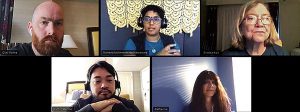
Nancy Kress and Ben Yalow presented the Lodestar Award for Best Young Adult Book, which went to A Wizard’s Guide to Defensive Baking by T. Kingfisher. Kingfisher (Ursula Vernon) accepted, saying, “I know that I should probably talk about the book, but frankly I wrote that book ages ago…” and regaled the audience with information about slime molds. “They are far and away the most alien intelligences on earth.” Kingfisher thanked publisher Argyll, voters, and husband Kevin.
The award for Best Related Work went to Beowulf by Maria Dahvana Headley. Headley accepted by video, sharing an anecdote about reading from her Beowulf novel The Mere Wife, and being approached by Elizabeth Engstrom and Betsy Mitchell, who asked when Dahvana’s translation of Beowulf would be coming out. “It had not occurred to me at all to do a translation of Beowulf… I said I wasn’t even qualified to do it and they looked at me and said that it seemed like I was qualified. It was their belief in me that started me down this path.” She thanked the “brilliant, intrepid, badass women” who helped her in her journey with the book, as well as her partner, her children, and more.
The Astounding Award for Best New Writer went to Emily Tesh. Gabrielle Harbowy accepted for Tesh, thanking agent Kurestin Armada, editor Ruoxi Chen, the Tordotcom publishing team, family, DisCon III, and “all of you.”
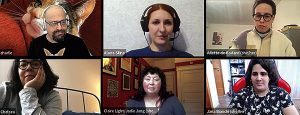
Next, the Best Video Game acceptance video by Greg Kasavin for Hades played, out of sequence. Kasavin said, “Video game storytelling has come a long way over the years. Games are really unique as a medium, in that they’re interactive, you can inhabit one of these fantastical worlds and see as it reacts to your every move. At Supergiant we’ve tried to marry the traditions of science fiction and fantasy literature with that unique interactive component and create these worlds that feel as though they’re alive as you navigate through them, so we’re so grateful that our work on Hades has stood out in that way.” He expressed gratitude to colleagues, family and friends, and “the Greek gods themselves….”
The winner of Best Short Story was “Metal Like Blood in the Dark” by T. Kingfisher, who presented even more astonishing slime mold facts.
Best Novelette went to “Two Truths and a Lie” by Sarah Pinsker, who accepted via video. Pinsker said, “These last two years have proven to me, again and again, how important our interconnection is.” She first thanked scientists, doctors, and nurses. She thanked voters and readers, Ellen Datlow, Tor.com, everyone at the 2019 Sycamore Hill workshop, particularly Usman T. Malik, agent Kim-Mei Kirtland, wife Zu, and more. “This story was a 20-year work in progress…. I only figured out what to do with it by rediscovering it. So, have patience with yourselves, writers.”

The Empress of Salt and Fortune by Nghi Vo won the Best Novella Award. Vo said, “The Empress of Salt and Fortune is a story about stories, specifically the ones that are ignored, buried, forgotten, or hidden. If you’re living in a world that wants you if not dead then silent, I think you know exactly the stories I’m talking about. I was very much alone when I wrote The Empress of Salt and Fortune. It was pulled from the unagented slush pile at Tordotcom. Ruoxi Chen was the first person who ever read it. I never thought I minded being alone until I realized in bits and pieces that I never have been. Realizing that you’re not alone, and that you never were, is a triumph. And it is one that Empress shares with every novella on the Hugo slate. Our stories are no longer hidden. And they will not be ignored. We’re not going to allow it.” She thanked Chen and the team, artist Alyssa Winans, agent Diana Fox, narrator Cindy Kay, friends, and everyone who “against all the odds have made their stories heard.”
The award for Best Series went to Martha Wells for The Murderbot Diaries. “I’ve been in this field since my first novel was published in 1993 and it has not always been good to me. At first I was too young, and later I was too old. I was from the wrong place. I had the wrong accent. I wasn’t friends with the right people. And I know that the amount of shit I’ve experienced is a small fraction compared to what writers of color and other marginalized writers have experienced and continue to experience in this field. There are people who don’t want you to write. They especially don’t want you to write and be published. They want all stories to be told by people who are just like them. They have many different ways of letting you know that. And they all add up, and sometimes the weight of it is crushing. I know sometimes it’s unavoidable, because of health problems or other things you just can’t do anything about. But if you feel that you’re being pushed out of this field, and you don’t want to be, I hope you will continue to write, and write your stories, and tell your truth, and push yourself back in. Because you never know what might happen if you keep trying. Your story may be the lifeline that your readers desperately need to pull them to shore.” Wells thanked voters, agents Jennifer Jackson and Michael Curry, editor Lee Harris, publisher Irene Gallo and everyone at Tordotcom, and more, as well as husband Troyce.
The Best Novel Award went to Network Effect by Martha Wells. Wells thanked friends and her husband, and said that Murderbot wouldn’t exist without the people at Tordotcom.
WORLDCON 2022 AND BEYOND
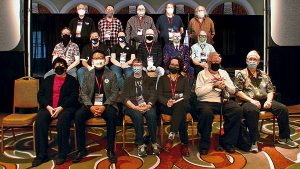
The 80th World SF Convention, Chicon 8, will be held September 1 – 5, 2022 in Chicago IL at the Hyatt Regency, featuring guests of honor Charles de Lint, Floyd Norman, Erle Korshak, fan guests Edie Stern and Joe Siclari, with Annalee Newitz and Charlie Jane Anders as toastmasters.
The 81st World SF Convention, Chengu WorldCon 81st, will be held at the Chengdu Century City New International Convention & Exhibition Center in August in Chengdu, Sichuan, China, featuring guests of honor Liu Cixin, Sergey Lukianenko, and Robert J. Sawyer.
–Arley Sorg & Liza Trombi
2021 WSFS Business Meeting
This year’s World Science Fiction Society Business Meeting had a full agenda to attend to. Here is a brief summary of the major decisions.
Hugo Award eligibility was extended for one year for four films that had very limited distribution in 2020. These were: Nine Days (supernatural drama); Beyond the Infinite Two Minutes (Japanese SF); Psycho Goreman (Canadian comedy-horror); and The Last Wolf: Karl Edward Wagner (documentary).
The Hugo Award for Best Series and the Lodestar Award were both confirmed as permanent fixtures, having been initially adopted on a trial basis.
The system of listing six Finalists in each award category based on five nominations from each voter was also made permanent. This had been part of the package of measures introduced to combat slate voting.
The deadline by which it is necessary to buy a membership in the World Science Fiction Society to nominate in the forthcoming Hugo Awards has been moved from the end of the previous year to January 31 of the year of the awards.
Several minor changes to the wording of the WSFS Constitution were also approved, along with some clarifications regarding voting eligibility.
All of the business passed on from CoNZealand was ratified. New business was not so fortunate. A proposal to reduce the number of episodes from a single series that can be Finalists in Best Dramatic Presentation: Short Form from two to one was rejected. A proposal to add a Best Audiobook category to the Hugo Awards suffered the almost inevitable referral to a committee.
Some changes to the wording of the Constitution to clarify Worldcon’s obligations with regard to membership data were discussed. These are needed to bring practice into line with international privacy legislation such as General Data Protection Regulation (GDPR). Some changes were passed on to Chicago, but the legislation is complex and Business Meeting members are not legal experts, so more work is needed on some of it.
Now back to membership issues. In part thanks to privacy legislation, and in part to clear up confusion, WSFS is moving towards clarifying that membership of the Society (which has attached voting rights, and commonly called a Supporting Membership) and membership of the Society’s annual conference (Worldcon), are separate things.
One corollary of this is that Hugo and Site Selection voting rights will not be transferable if you sell your Worldcon attending membership. The person you sell it to either has to have a WSFS membership or buy one, and you keep your voting rights.
Another corollary is that voting rights are dependent on being a member of WSFS in good standing, and not on technicalities such as correctly quoting your membership number on a ballot form.
This issue came into sharp focus at DisCon III thanks to controversy over the validity of many of the votes for the Chengdu bid. Mail-in paper ballots need to be validated to ensure that they come from actual members, and traditionally both Hugo Award and Site Selection administrators have had the right to disallow suspicious-looking ballots. With electronic voting, there is much less need for validation, as members typically log into the voting site with the membership details.
Despite being associated with actual memberships, many of the pro-Chengdu site selection ballots looked suspicious, as they were lacking many of the usual identification data. This was in large part due to issues with the Chinese translation of the ballot form, which did not properly explain what information was required. The Business Meeting was asked if these ballots should be allowed. It decided that they could be rejected, but that would be up to DisCon III’s Site Selection Administrator, who chose to allow them.
The controversy has shone a spotlight on how means of identification online are different in different countries. Now that WSFS is much more international, a system of accepting and validating memberships from anywhere in the world is clearly required.
Over the past year, DisCon III suffered several controversies surrounding the Hugo Awards, which led to the resignation of both the original co-chairs. Another issue blew up at the award ceremony itself, when Raytheon Aerospace was revealed as a sponsor. Many finalists were unhappy at being associated with a company that has involvement in arms manufacturing, and social media jumped on the issue.
Most reporting suggested that Raytheon was sponsoring the Hugo Awards, with some people claiming that naming rights to the award had been sold. It is unclear what arrangement DisCon III had with Raytheon. However, as best as I can ascertain, neither the WSFS Mark Protection Committee, nor anyone involved with Hugo Award Administration for DisCon III was asked for permission to sell naming rights.
–Cheryl Morgan
From the February 2022 issue of Locus.
 While you are here, please take a moment to support Locus with a one-time or recurring donation. We rely on reader donations to keep the magazine and site going, and would like to keep the site paywall free, but WE NEED YOUR FINANCIAL SUPPORT to continue quality coverage of the science fiction and fantasy field.
While you are here, please take a moment to support Locus with a one-time or recurring donation. We rely on reader donations to keep the magazine and site going, and would like to keep the site paywall free, but WE NEED YOUR FINANCIAL SUPPORT to continue quality coverage of the science fiction and fantasy field.
©Locus Magazine. Copyrighted material may not be republished without permission of LSFF.





